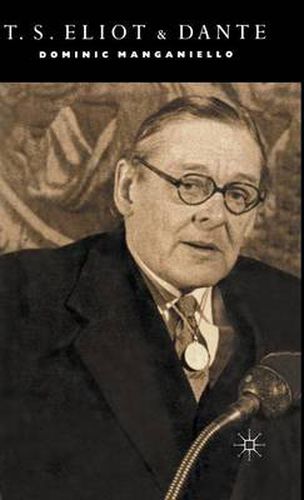Readings Newsletter
Become a Readings Member to make your shopping experience even easier.
Sign in or sign up for free!
You’re not far away from qualifying for FREE standard shipping within Australia
You’ve qualified for FREE standard shipping within Australia
The cart is loading…






This title is printed to order. This book may have been self-published. If so, we cannot guarantee the quality of the content. In the main most books will have gone through the editing process however some may not. We therefore suggest that you be aware of this before ordering this book. If in doubt check either the author or publisher’s details as we are unable to accept any returns unless they are faulty. Please contact us if you have any questions.
Ezra Pound belatedly conceded that T.S.Eliot was the true Dantescan voice of the modern world. This is the first study to deal with this assertion and the relationship between the two poets. It attempts to show how Dante’s total vision impinges on Eliot’s craft and thought. Eliot’s indebtedness to his Italian master, whose poetry he deemed as the most persistent and deepest influence upon his own verse, manifests itself in a variety of literary strategies, including imitation, parody, citation and allusion. At the same time Eliot’s debt transcends the literary to embrace Dante’s total vision, or his philosophy, theology and politics. Various aspects of Eliot’s recourse to Dante’s craft and thought may appear in a new light - his recurring fascination with Ulysses in Inferno XXVI and especially with Arnaut Daniel in Purgatorio XXVI ; the exodus motif as it informs The Waste Land , The Hollow Men and Ash Wednesday ; the metaphor of Dante’s book of memory as it applies to Eliot’s work; the notion of order in its ethical, aesthetic and political dimensions. Finally, light is shed on some of the reasons why Eliot’s Dante ultimately differs radically from that of the other moderns.
$9.00 standard shipping within Australia
FREE standard shipping within Australia for orders over $100.00
Express & International shipping calculated at checkout
This title is printed to order. This book may have been self-published. If so, we cannot guarantee the quality of the content. In the main most books will have gone through the editing process however some may not. We therefore suggest that you be aware of this before ordering this book. If in doubt check either the author or publisher’s details as we are unable to accept any returns unless they are faulty. Please contact us if you have any questions.
Ezra Pound belatedly conceded that T.S.Eliot was the true Dantescan voice of the modern world. This is the first study to deal with this assertion and the relationship between the two poets. It attempts to show how Dante’s total vision impinges on Eliot’s craft and thought. Eliot’s indebtedness to his Italian master, whose poetry he deemed as the most persistent and deepest influence upon his own verse, manifests itself in a variety of literary strategies, including imitation, parody, citation and allusion. At the same time Eliot’s debt transcends the literary to embrace Dante’s total vision, or his philosophy, theology and politics. Various aspects of Eliot’s recourse to Dante’s craft and thought may appear in a new light - his recurring fascination with Ulysses in Inferno XXVI and especially with Arnaut Daniel in Purgatorio XXVI ; the exodus motif as it informs The Waste Land , The Hollow Men and Ash Wednesday ; the metaphor of Dante’s book of memory as it applies to Eliot’s work; the notion of order in its ethical, aesthetic and political dimensions. Finally, light is shed on some of the reasons why Eliot’s Dante ultimately differs radically from that of the other moderns.